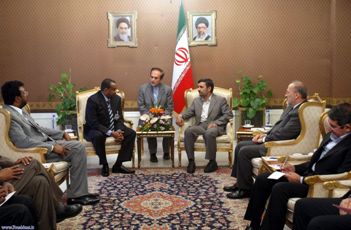Iran president hails “strategic ties” with Sudan
September 15, 2010 (KHARTOUM) – Iranian President Mahmoud Ahmadinejad on Wednesday lauded “deep, brotherly, and strategic” relations with Sudan and vowed that his country will “defend the rights of the Sudanese nation and government.”

Ahmadinejad said that “hegemonic system would never want to see any powerful and big country in the world, so, with different methods; they confront independent and freedom-seeking nations.”
For his part, Ali termed Iran-Sudan ties “excellent,” adding that their bilateral relations were expected to grow “more and more and include economic and trade grounds.”
The state minister also said that his meeting with Ahmadinejad would “take big steps toward increasing cooperation between Iran and African states.”
He went on to reciprocate Ahmadinejad’s statement by pledging that Sudan would defend Iran’s right to use peaceful nuclear technology.
Iran is under growing international pressure to forgo its nuclear program. The UN Security Council recently endorsed an additional package of sanctions against the country on grounds of suspicion over its intent to develop a nuclear bomb.
Despite the Sunna-Shi’ah divide between the two countries, Sudan and Iran have increased their bilateral cooperation in recent years to include economic, military, and nuclear issues.
Sudan has publicly appeared as a supporter of Iran’s right to enrich uranium for “peaceful” nuclear purposes. In 2006, Sudan’s President Omar Al-Bashir called Iran’s enrichment of uranium “a great victory for the Islamic world” and said that he supported Iran’s right to its peaceful nuclear program.
In March 2008, Sudan and Iran signed a military cooperation agreement at the end of a second round of negotiations between the defense ministers of the two countries.
On the economic front, bilateral trade between Iran and Sudan reached $43 million a year in 2006. Iran is also engaged in several development projects in Sudan, including a water treatment and electrical production projects, which Sudan claims value $30 million and $130 million dollars respectively.
A pro-opposition daily newspaper in Sudan was suspended indefinitely this year for reporting that Iran’s revolutionary guards had set up a weapons factory in Khartoum in order to supply arms to Islamic insurgents in Somalia and the Hamas movement.
(ST)
